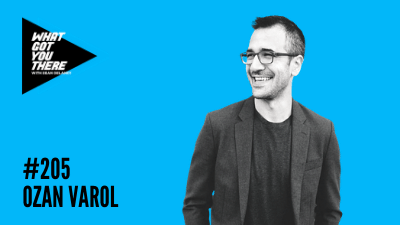#205 Ozan Varol – Episode Notes

THINK LIKE A ROCKET SCIENTIST
Simple Strategies You Can Use to Make Giant Leaps in Work and Life
Ozan Varol is a rocket scientist turned award-winning professor and author of the new book Think Like a Rocket Scientist: Simple Strategies You Can Use to Make Giant Leaps in Work and Life.
A native of Istanbul, he studied astrophysics at Cornell University and served on the operations team for the 2003 Mars Exploration Rovers. Varol later became a law professor at Lewis & Clark College.
In this episode Ozan discusses strategies and frameworks learned from his time as a rocket scientist that we can all use to make advances in our own lives!
Key Takeaways
Ozan’s autonomy growing up is what he attributes to his gravitation towards self-taught learning, therefore resulting in him establishing himself in a variety of industries.
● “Each pivot was rooted in the belief that anything is possible, I get to write my own life story and my story doesn’t become my identity” ●
When Ozan is faced with uncertainty and is afraid to commit to a decision, he turns to the one door and two door decision making theory, realizing that most decisions are two door decisions.
● “We spend so much time trying to figure out the best course of action, the best choice, the best decision, but you don’t know what’s going to be best until you try” ●
He makes sure to take time for himself without any distractions every day, technology included.
● “It’s amazing the number of original ideas you can generate if you simply carve out time to do nothing everyday” ●
2:45 Path to Astronomy and Astrophysics
Ozan grew up in Istanbul and his first experience with astrophysics was around 4 years old when his dad would take a candle and his soccer ball and rotate the soccer ball around the candle to show him how the Earth revolves around the sun
Watched the original Cosmo series by Carl Saagen
Ozan knew he had to leave Turkey if he wanted to be on the frontier of astrophysics and he was accepted into Cornell University
He reached out to a professor working on the Mars Exploration Rover’s Mission in 2003 and thanks to the coding he taught himself in high school he got a job working with on the operations team for the two rovers that went to Mars in 2003
5:44 Self Taught Learning and Deep Rooted Curiosity
Ozan gives credit to his parents because they didn’t stifle his creativity by giving him autonomy.
An example he gives is that his parents filtered out the different kindergartens they thought were acceptable for him and let Ozan make the final decision which empowered him as a young child .
8:06 Importance of Autonomy
Ozan has established himself in many different areas of work
Started out in astrophysics and the 2003 Mars mission ➔ completed law school and became a law professor ➔ began writing books and began speaking to corporate offices.
● “Each pivot was rooted in the belief that anything is possible, I get to write my own life story and my story doesn’t become my identity” ●
Ozan references a poem by Donna Marcova called “I will Not Die an Unlived Life”
He asks himself two questions whenever he is afraid of making a pivot:
- What’s the worst that can happen
- What’s the best that can happen
14:08 Facing Uncertainty
Ozan describes the difference between one way door and two way door decisions
- One way door is the fear that if you take a leap there’s no turning back
- Most decisions are two way doors – you can step into an uncertain environment and you can leave if you want
He reflects on the immense agonizing he endured over the decision to leave the practice of law to go into academia
- He realized it was a two way door decision, he could always go back to practicing law
- Many decisions that look like one way door decisions are actually two way door decisions
● “The only way to reduce uncertainty is to run small experiments” ●
17:08 Marketing Strategies
When Ozan was trying to pre sell his first book he asked himself:
● “What can I do to provide value that’s tied to the book now?” ●
After brainstorming he created 5 bite size videos to give as an addition with the book and within 24 hours there were hundreds of sales
● “We spend so much time trying to figure out the best course of action, the best choice, the best decision, but you don’t know what’s going to be best until you try” ●
20:20 Battling Against “Failing Fast”
Ozan doesn’t buy the idea of ‘failing fast’
● “Just because you’re failing fast and often, doesn’t mean you’re actually getting anything out of failing” ●
Ozan thinks that if we don’t figure out the ‘Why’ to our failure, we end up failing again and again.
● “Failure can be the best teacher if you know how to approach it properly” ●
25:03 Holding Himself Accountable
Ozan doesn’t tie his ego to a failed project
The key for him is to reassure himself and see what he can learn from it
Whether you’re project is a failure or a success, always ask yourself these questions:
- What went right with this failure?
- What went wrong with the success?
28:30 Measuring Skill vs. Luck
Ozan believes that to measure skill versus luck you have to do two things:
· #1 Do the the same things numerous times and compare outcomes
· #2 Ask an outside perspective
He says the importance of an outside perspective is that they ask questions that need to be asked and help see blind spots that he might be missing
● “Most people that have revolutionized history are the ones that were original outsiders disturbing the industry they were going into” ●
Ex: Elon Musk was outsider to space industry and learned rocket science by reading books
32:36 Ozan’s Advice for Sean’s Decision Journals
Sean asks Ozan what he should focus on with his decision journals and Ozan’s primary advice is to keep track of the decisions you make and why.
It’s good to keep track of your ‘why’ overtime because sometimes the ‘why’ changes
- Keeping track of the ‘why’ changing keeps you honest and doing things for the right reasons
● “My why in the world is helping people reimagine the status quo” ●
36:25 Decision Mapping Process
Ozan praises the software called Roam Research for helping him to organize his thoughts and his writing.
38:44 Approach to Learning New Things
Ozan provides listeners with what NOT to do when approaching learning new things:
- Copy and paste other people’s tactics
- This gets very amplified in periods of uncertainty
● “Ask Is this a tactic or is this a strategy?” ●
- Tactics: the ‘what’ questions
- Strategy: the ‘why’ questions
43:42 Everyday Knowledge Space
Ozan writes everyday, approaching it like a workout
The more that he can write, the better off his thinking is going to be
● “I don’t know what I think about something until I write about it” ●
He also makes sure to relax without technology, and says that some of the best ideas he’s had have been in moments of slack.
● “It’s amazing the number of original ideas you can generate if you simply carve out time to do nothing everyday” ●
References Cal Newport’s book Deep Work
48:17 Writing Process
Ozan describes his writing process as a free flow.
He provides an example from a recent article he wrote on diversification
➤ https://ozanvarol.com/how-to-get-ahead-by-diversifying-your-identity/
In a moment of slack he thought,
● “What if we take the idea of diversification and apply it to our identity” ●
He didn’t research if anything had been written about this before and believes if he had researched he probably wouldn’t have gotten the same insights.
53:04 Book Recommendations
Ozan’s first recommendation is for people to not just read the books that other people are reading.
Range: Why Generalists Triumph in a Specialized World by David Epstein
Teaching as a Subversive Activity by Neil Postman
56:43 New Book Think Like a Rocket Scientist
With Ozan’s new novel, Think Like a Rocket Scientist, he wanted to bust the myth that you don’t have to be a rocket scientist to think like one.
It focuses on 9 Simple Strategies from Rocket Scientists that anybody can use
● “Look at what’s seemingly impossible and turn that into the possible” ●
➤ https://ozanvarol.com/books/
1:00:23 Final Question
Sean asked Ozan,
“If you could sit down for an evening of interviews dead or alive but not a family member or close friend, who would you choose?”
Ozan responded with a stacked list including:
o Albert Einstein
o Carl Sagan
o Richard Feynman

